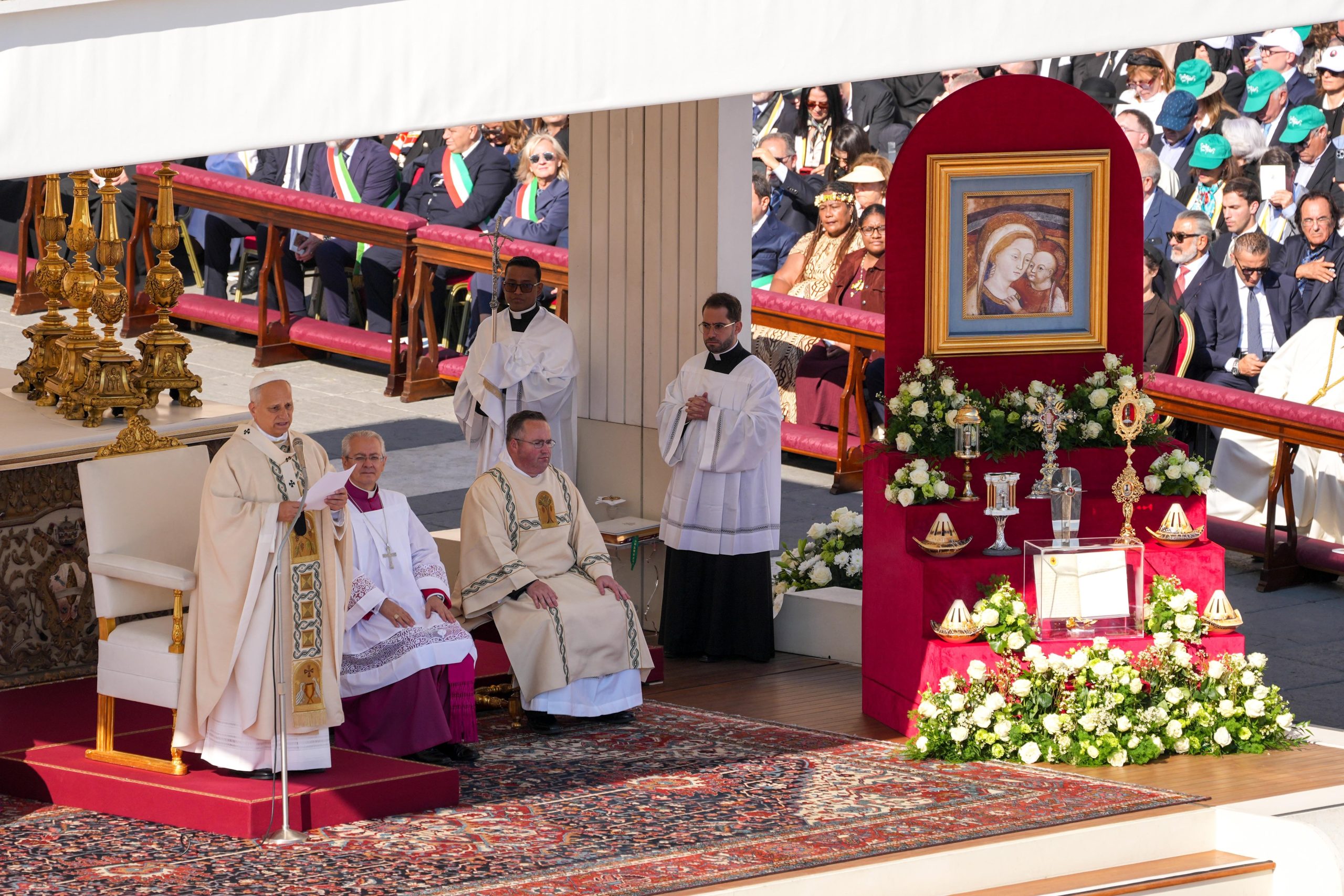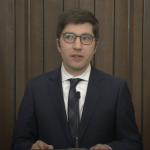VATICAN CITY (CNS) — Canonizing seven new saints on World Mission Sunday, Pope Leo XIV said God is present wherever the innocent suffer, and his form of justice is forgiveness.
“God grants justice to all, giving his life for all,” he said in his homily during a canonization Mass in St. Peter’s Square Oct. 19 — the second-to-last Sunday of October, when the church prays for missionaries and their efforts in evangelization, education, health care and other ministries.
“Indeed, it is this faith that sustains our commitment to justice, precisely because we believe that God saves the world out of love, freeing us from fatalism,” he said. “When we hear the cries of those in difficulty, let us ask ourselves, are we witnesses to the Father’s love, as Christ was to all?”
Jesus “is the humble one who calls the arrogant to conversion, the just one who makes us just,” he said.
During the second canonization ceremony of his pontificate, Pope Leo declared the sainthood of seven men and women from the 19th to the 21st centuries, including Venezuela’s first saints: St. Maria Rendiles Martínez and St. José Gregorio Hernández Cisneros.
St. Rendiles was the Venezuelan founder of the Congregation of the Servants of Jesus, who was born in Caracas in 1903 and died in 1977. St. Hernández was born in 1864 and became a Third Order Franciscan. A Venezuelan doctor, he became known as “the doctor of the poor,” and he was killed in an accident in 1919 on his way to helping a patient.
The pope also canonized:
— St. Ignatius Maloyan, the martyred Armenian Catholic archbishop of Mardin, which is in present-day Turkey; born in 1869, he was arrested, tortured and executed in Turkey in 1915.
— St. Peter To Rot, a martyred lay catechist, husband and father from Papua New Guinea. Born in 1912, he was arrested in 1945 during the Japanese occupation in World War II and was killed by lethal injection while in prison.
— St. Vincenza Maria Poloni, founder of the Sisters of Mercy of Verona, Italy; she lived from 1802-1855.
— St. Maria Troncatti, a Salesian sister born in Italy in 1883 who became a missionary in Ecuador in 1922. She died in a plane crash in 1969.
— St. Bartolo Longo, an Italian lawyer born in 1841. He had been a militant opponent of the church and involved in the occult, but converted, dedicating himself to charity and to building the Pontifical Shrine of the Blessed Virgin of the Rosary of Pompei. He died in 1926.
The pope called the new saints “faithful friends of Christ” who are “not heroes or champions of some ideal, but authentic men and women,” who were martyrs for their faith, evangelizers, missionaries, charismatic founders and “benefactors of humanity.”
Having faith on earth is what “sustains the hope for heaven,” the pope said in his homily.
In fact, Christ tells his disciples “to pray always” without becoming weary, he said. “Just as breathing sustains the life of the body, so prayer sustains the life of the soul: faith, in fact, is expressed in prayer, and authentic prayer lives on faith.”
In his parable of the persistent widow in the day’s Gospel reading (Lk. 18:1-8), Jesus asks his disciples if they believe God is a just judge toward everyone, and “if we believe that the Father always wants our good and the salvation of every person.”
It is important to ask because two temptations test this belief, the pope said. The first temptation “draws strength from the scandal of evil, leading us to think that God does not hear the cries of the oppressed and has no pity for the innocent who suffer.”
“The second temptation is the claim that God must act as we want him to: prayer then gives way to a command to God, to teach him how to be just and effective,” he said.
But Jesus “frees us from both temptations,” especially with his words during his passion, “Father, your will be done,” Pope Leo said.
“The cross of Christ reveals God’s justice, and God’s justice is forgiveness. He sees evil and redeems it by taking it upon himself,” he said. “When we are ‘crucified’ by pain and violence, by hatred and war, Christ is already there, on the cross for us and with us.”
“There is no cry that God does not console; there is no tear that is far from his heart,” he said. “The Lord listens to us, embraces us as we are, and transforms us as he is.”
“Those who reject God’s mercy, however, remain incapable of mercy toward their neighbor. Those who do not welcome peace as a gift will not know how to give peace,” he said.
Jesus invites the faithful “to hope and action,” and he asks, “When the Son of Man comes, will he find faith in God’s providence?” the pope said.
After the Mass and before praying the Angelus, Pope Leo thanked the leaders and dignitaries from different countries who attended the canonization Mass, including Italian President Sergio Mattarella and Lebanese President Joseph Khalil Aoun.
He told some 70,000 people present that “today is World Mission Day.” While the entire church is missionary, “today we pray especially for those men and women who have left everything behind to bring the Gospel to those who do not know it,” he said. “They are missionaries of hope among all peoples.”




